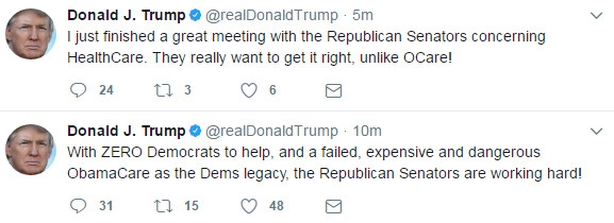Facing a potentially disastrous defeat by members of his own party, US Senate Majority Leader Mitch McConnell decided to delay a vote on healthcare legislation in order to get more support from Republican senators.
President Donald Trump summoned all 52 Republican senators to the White House this afternoon to discuss how to proceed.
Mr McConnell had been pushing for a vote ahead of the 4 July recess that starts at the end of the week.
The legislation would advance a repeal of major elements of Obamacare and replace it with a new federal healthcare programme.
The delay showed Mr McConnell and Mr Trump have failed so far to attract enough votes amid a solid block of Democratic opposition and attacks from both moderate and conservative Republican senators.

Mr McConnell, who has a razor-thin majority in the Senate, told reporters that Republican leaders were still working to get the 50 votes to pass the bill, adding that the White House was anxious to help write legislation that could pass the Senate.
While the House of Representatives narrowly passed a measure last month to replace Obamacare, the Senate version stalled today as a small group of senators held out.
Moderate senators worried that millions of people would lose their insurance.
Conservatives said the bill does not do enough to erase Democratic former president Barack Obama's signature domestic legislation.
US stock prices fell after the decision to postpone the vote.
US stocks have rallied this year on hopes for tax reform, deregulation and changes to the health sector. Markets are beginning to doubt whether the Trump administration can fulfill its promises.
The bill's prospects were not helped by an analysis by the nonpartisan Congressional Budget Office yesterday saying the measure would cause 22 million Americans to lose medical insurance over the next decade even as it reduced the federal deficit by $321 billion over the next decade.
The report prompted Senator Susan Collins, a key moderate vote, to say she could not support moving forward on the bill as it stands.
At least four conservative Republican senators said they were still opposed after the CBO analysis.
Passing the measure would hand Mr Trump a legislative win as he seeks to shift attention after weeks of questions over Russia's role in last year's US presidential election.

